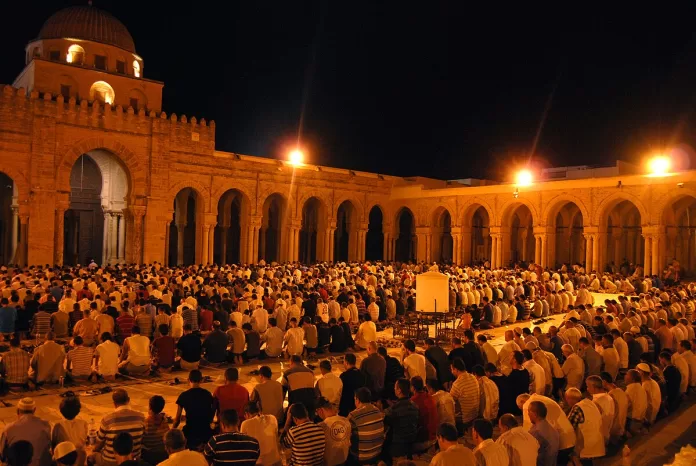Introduction
This article delves into the intricacies of additional, non binding, voluntary prayer called Tahajjud, Taraweeh, Qiyam al-Layl, and Qiyam Ramadan, with the aim to address overlooked aspects often clouded by preconceived notions, traditional beliefs, and interpretations. Rather than merely echoing conventional perspectives, this piece endeavors to ground its analysis in the core teachings of the Qur’an and Sunnah. Any deviation from these authentic sources or reliance on ambiguous, rejected, or abrogated rulings should be dismissed outrightly.[1]
Here is an example, for instance, using verses revealed about the benefits and harms of alcohol[2] as evidence of its permissibility—when a later verse clearly prohibits it—is misleading and inappropriate. For the past fourteen hundred years countless debates and disagreements have surrounded “Taraweeh prayers”—the optional prayers (Nawafil) performed after the Isha prayer[3].
These prayers, also called Sunnah, include short breaks after every four units (rakʿahs), during which worshippers engage in glorification (tasbīḥ), supplication, and ‘rest’.
This practice eventually became known as “Taraweeh” (meaning “rests”). However, numerous questions persist: Are ‘Qiyam Ramadan’ or ‘Qiyam al-Layl’ (Night prayers) classified as Nawafil or Sunnah? Are Tahajjud, Tarawih, Qiyam alLayl, and Qiyam Ramadan different names for the same act of worship, or are they distinct prayers?
How many rakʿahs (units) are prescribed for each? Different Muslim sects and schools of thought have accumulated vast collections of conflicting opinions, traditions, hadiths, and interpretations[4].
For the average Muslim, either follow the ancestors blindly or discerning the correct stance, which can be exceedingly challenging.
Each group cites hadiths that support their perspective while dismissing others’ evidence as weak, fabricated, or unreliable. Though a resolution exists, that discussion is a separate subject[5].
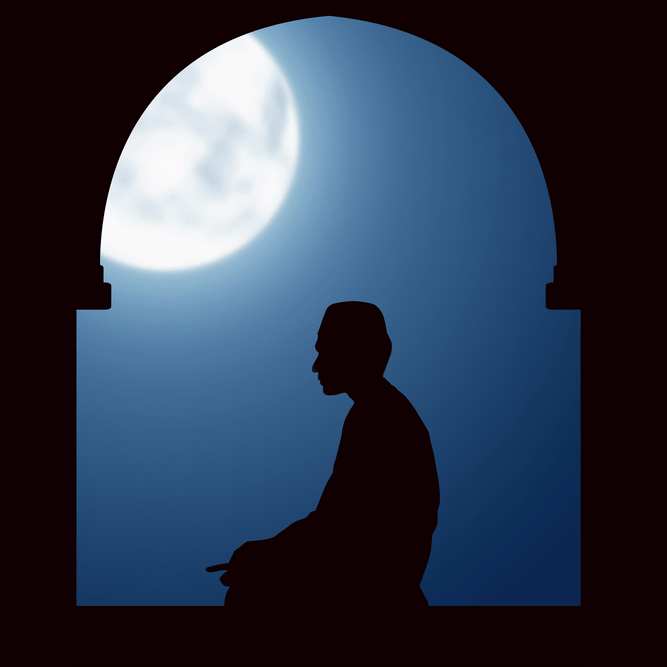
Commands (آيَاتٌ مُّحْكَمَاتٌ) must be Rooted in the Quran
Some may argue that it is the duty of scholars to navigate such complexities, not the average Muslim. However, this issue carries profound lessons. When Hazrat Adi ibn Hatim (may Allah be pleased with him), a former Christian, embraced Islam after meeting the Prophet(صلى الله عليه وسلم), he asked about the Quranic verse: “They have taken their scholars and monks as Lords besides Allah…” (Quran 9:31). Adi ibn Hatim inquired, “How can we be accused of taking our scholars and monks as ‘lords’ when we do not worship them?” The Prophet(صلى الله عليه وسلم) responded: “Is it not true that you [Christians] considered what they declared forbidden as forbidden and what they declared permissible as permissible?” Adi replied, “Indeed, we did.” The Prophet(صلى الله عليه وسلم) said: “That is how you took them as lords.”
This teaches us that those who determine what is halal (permissible) and haram (forbidden) without divine authority essentially assume the role of God. Those who accept such human legislation are, in effect, elevating these individuals to the status of deities. Salat (prayer) is a fundamental act of worship that cannot be established based on personal interpretations or desires. Only Allah has the authority to legislate, and He sent the Messenger (صلى الله عليه وسلم) to convey His commandments. It is not permissible to alter or reinterpret divine injunctions to suit personal preferences. (extract from Tafhim-ul-Quran)[6] Three Hadith are important in this context; Al-Bukhari:2010, 2013, 7290[7].
Any religious Commandment must have roots in the Quran:[8] Sunnah is a reflection, practical demonstration of the Quran[9]. “We have appointed acts of worship for every nation, which they [are to] observe.” (22:67), (42:21), (31:6). “To each of you We prescribed a law and a method…(5:48) “Unlike Tahajjud, which is explicitly mentioned in the Quran,[10] Taraweeh emerged spontaneously, who ordered it? It’s still a mystery. Umar (may Allah be pleased with him) did not introduce the practice; he merely unified its performance by appointing a single Imam.” There is no mention of Taraweeh in the Quran or Sunnah.
Three Nights Prayer Abandoned Al-Bukhari: 7290
Narrated Zaid bin Thabit: The Prophet took a room made of date palm leaves mats in the mosque. Allah’s Apostle prayed in it for a few nights till the people gathered (to pray the night prayer (behind him.) Then on the 4th night the people did not hear his voice and they thought he had slept, so some of them started humming in order that he might come out. The Prophet then said, “You continued doing what I saw you doing till I was afraid that this (prayer) might be enjoined on you, and if it were enjoined on you, you would not continue performing it.
Therefore, O people! Perform your prayers at your homes, for the best prayer of a person is what is performed at his home except the compulsory congregational) prayer.” (Al-Bukhari; 7290[11], Muslim: 1825). Ramadan fasting was made compulsory in 2nd Hijra, hence this incident must have occurred by then.
Virtue of Offering Voluntary Prayer at Home
The Prophet(صلى الله عليه وسلم) encouraged performance of non obligatory prayers at home, he mentioned it on many occasions; that there is a great incentive and blessing to offer non obligatory prayer at home, which makes it more rewarding than praying at Prophet’s (صلى الله عليه وسلم) Mosque.[12]

Duration: Units/ Ra’kat
Narrated Abu Salama bin `Abdur Rahman: that he asked `Aisha “How was the prayer of Allah’s Apostle in Ramadan?” She replied, “He did not pray more than eleven rak`at in Ramadan or in any other month. He used to pray four rak`at —- let alone their beauty and length—-and then he would pray four —-let alone their beauty and length —- and then he would pray three rak`at (witr).” She added, “I asked, ‘O Allah’s Apostle! Do you sleep before praying the witr?’ He replied, ‘O `Aisha! My eyes sleep but my heart does not sleep.”[13]
This duration is in line with the general policy of ease and simplicity in Islam. Allah and His Messenger(صلى الله عليه وسلم) are always concerned about its followers, not to overburden them. Recitation of the Quran is also left to strength and the capacity of people, explained in detail in the Quran.[14]
New Prayer (ُ ِ ْدعَة ِ ْعَم الب ن ) at Night in Congregation by Umar (RA)14 Hijra.A) Al-Bukhari: 2010
‘Abdur Rahman bin ‘Abdul Qari said, “I went out in the company of ‘Umar bin Al-Khattab one night in Ramadan to the mosque and found the people praying in different groups. A man praying alone or a man praying with a little group behind him. So, ‘Umar said, ‘In my opinion I would better collect these (people) under the leadership of one Qari (Reciter) (i.e. let them pray in congregation!)’. So, he made up his mind to congregate them behind Ubai bin Ka’b. Then on another night I went again in his company and the people were praying behind their reciter. On that, ‘Umar remarked, ‘What an excellent Bid’a «هِذِه َ ُ ِ ْدعَة ِ ْعَم الب ن» (i.e. innovation in religion) this is; but the prayer (Tahjjud) which they do not perform, but sleep at its time is better than the one they are offering.’ He meant the prayer in the last part of the night (Tahajjud). (In those days) people used to pray in the early part of the night.”[15]
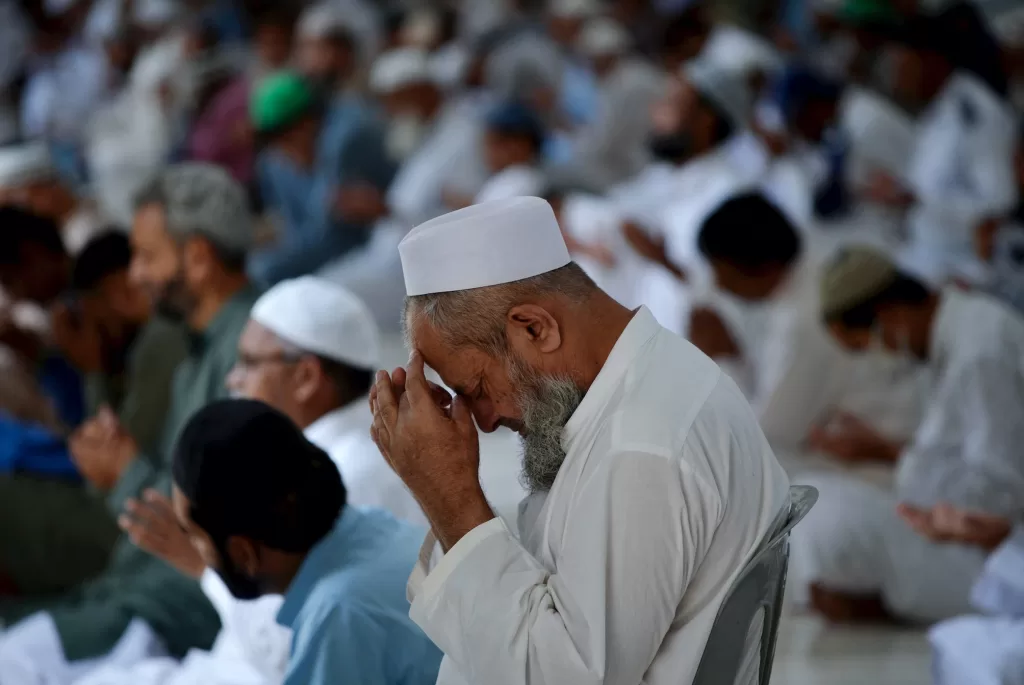
Worship in Ramadan Balancing Tradition and Modern Access
In today’s fast-paced digital age, many struggle to prioritize deep engagement with religious practices, yet Ramadan remains a sacred month of devotion and divine blessings. Millions dedicate 80–90 minutes daily to congregational Taraweeh prayers, seeking spiritual fulfillment.
However, true reward and Allah’s pleasure lie not merely in ritual participation but in aligning worship with the authentic teachings of the Prophet Muhammad(صلى الله عليه وسلم). Critically, understanding these distinctions has never been easier. The internet and AI-powered tools now place centuries of Islamic scholarship, Hadith databases, and Quranic exegesis at our fingertips. With a few clicks, one can verify the Prophet’s guidance on prayer timings, congregational norms, and the virtues of worshiping at home.
This accessibility dismantles excuses for ignorance and invites Muslims to revive the Prophet’s(صلى الله عليه وسلم) unaltered Sunnah with confidence. Ramadan demands more than ritualistic routines; it calls for intentional, knowledge-based worship. While Taraweeh fosters community unity, its merit pales in comparison to the spiritually transformative Tahajjud—prayed in solitude, free from ostentation, and deeply rooted in the Prophet’s example. Let this Ramadan be a turning point: leverage technology to learn, reflect, and prioritize what truly aligns with divine guidance. As the Prophet(صلى الله عليه وسلم) warned, “Deeds are judged by intentions”—let ours be anchored in clarity, not convenience.[16] Remember we are answerable to God for beliefs and deeds alone.(6:94)[17]
Noteworthy Aspects
The Prophet Muhammad(صلى الله عليه وسلم), to avoid placing an excessive burden on the Muslim community, generally performed Tahajjud (late-night prayer) privately at home. During Ramadan, he conducted the prayer in congregation (spontaneously formed) for three consecutive nights, but on the fourth night, he discontinued it, instructing people to pray individually at home (Hence Sunnah is abrogated/invalidated). This decision was made to prevent the prayer from being considered obligatory. The Prophet(صلى الله عليه وسلم) emphasized that performing voluntary prayers at home is more rewarding than performing them in the mosque, except for obligatory prayers.[18] This practice continued during the time of the Prophet (صلى الله عليه وسلم), the first caliph Abu Bakr Siddiq (عنه هللا رضي), and into the early caliphate of Umar ibn al-Khattab.(may Allah be pleased with him).
Caliph Umar’s (RA) Role in Organizing of Congregational Prayer
In 14AH (12th year of Ramadan), Caliph Umar (رضي عنه هللا) noticed that people were praying Qiyam Ramadan (non-obligatory night prayers) after Isha in small, scattered groups. To foster unity and administrative convenience, he organized them behind a single Imam and called it (“البدعه نعم”) “Ni’ma al-Bid’ah” (a good innovation) in the ‘linguistic sense’.[19] He did not refer to it as “Sunnah” because the Prophet(صلى الله عليه وسلم) had abandoned the congregation for three nights only and advised the people to offer prayer at home. The scholars opine that after the death of the Prophet(صلى الله عليه وسلم), the fear of the prayer becoming obligatory was lifted.
Therefore, reviving the congregation for night prayers in Ramadan became acceptable, considering the principle of [20] (‘الزمان بتغییر احکام تغییر”) ‘taghayyur al-ahkam bi-taghayyur al-zaman” (change of rulings with changing circumstances). However, the term “Ni’ma al-Bid’ah”,”البدعه نعم “became controversial as the Prophet(صلى الله عليه وسلم )warned against innovations in religious practices.Calling a new thing in religions is (لغوی) linguistically ”نعم البدعه” as not understood as its a religious matter which is under discussion. The user of this term (“البدعه نعم “) did not make any mention of such distinction. It is the later scholars who introduced linguistic (لغوی ) meanings.
The Prophet (صلى الله عليه وسلم ) said: ‘Beware of newly invented matters [in religion] (وَاِیَّاکُمْ وَمُحْدَثَاتِ الْاُمُوْرِ) ‘Indeed, every newly invented matter is an innovation, (فَاِنَّ کُلَّ مُحْدَثَۃٍ بِدْعَۃٌ)‘ and ‘Every deviation is misguidance.'” (وَکُلُّ بِدْعَۃٍ ضَلَالَۃٌ).[21] He is also known to have said to follow his Sunnah and Sunnah of Rightly Guided Caliphs, but the Caliphs neither stopped the practice, nor participated in it. And those who came after them say: “Our Lord! Forgive us and our brethren who have preceded us in faith, and put not in our hearts any hatred against those who have believed. Our Lord! You are indeed full of kindness, Most Merciful. (59:10).[22]
Those were a people that have passed away; what they did is theirs and what you have done is yours. You will not be answerable for their deeds. (2:134)[23]
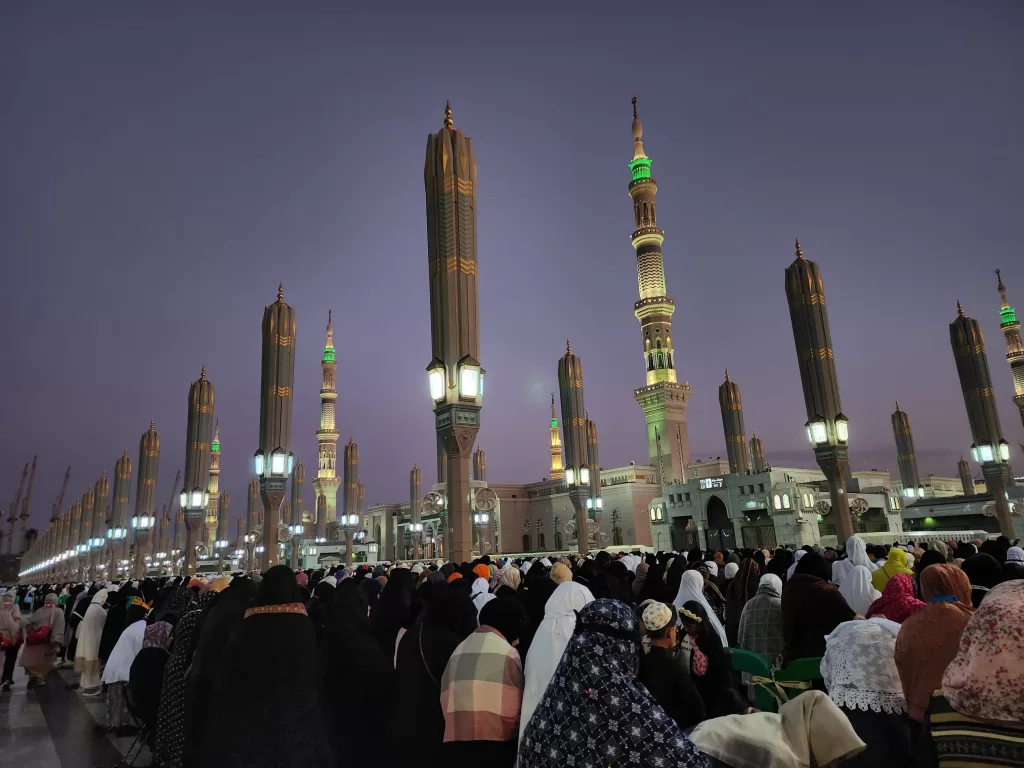
Sunnah of Tahajjud
The Tahajjud prayers has been unambiguously mentioned in Quran[24], practiced regularly hence rooted in the Prophet Muhammad’s (صلى الله عليه وسلم) unwavering practice, emphasizes praying individually at home—a tradition he upheld year-round, including during Ramadan. He explicitly affirmed that the best prayer after the obligatory ones is the night prayer “(Tahajjud),” and stressed the superiority of home worship by declaring, “A person’s prayer at home is more excellent than his prayer in my mosque (Masjid Nabawi), except for obligatory prayers.”[25] This divine wisdom elevates voluntary home prayers as a means to deepen one’s personal connection with Allah, safeguard sincerity by shielding against ostentation, transform homes into sanctuaries of worship, and nurture spiritual awareness within families. By prioritizing this Sunnah, believers not only align with the Prophet’s (صلى الله عليه وسلم) teachings but also cultivate an environment where faith flourishes privately and collectively, enriching both individual devotion and household blessings.
Understanding the Controversy
The Tahajjud prayer is fundamentally different from the Taraweeh organised by Umar (رضي الله عنه). While Taraweeh is performed soon after Isha, Tahajjud is performed later in the night when people are asleep, as per the Prophet’s (صلى الله عليه وسلم ) practice. Umar (رضي الله عنه) himself acknowledged that “the portion of the night in which people sleep is better and more virtuous than the one in which they pray now.” There remains an inherent caution against labeling any new practice as “Sunnah” when it lacks consistent prophetic endorsement. The Quran (3:7) emphasizes that clear and unambiguous rulings do not require interpretation. Hence, attributing the label of “Sunnah” to congregational Tarawih remains a contentious point.
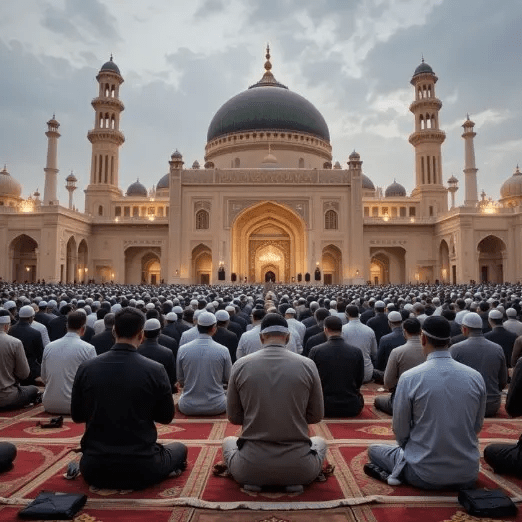
The Disagreement Among the Companions
The Prophet Muhammad (صلى الله عليه وسلم ) established a fundamental principle that all prayers, apart from the obligatory ones, are best performed at home — even more so than in Masjid al-Nabawi. Therefore, the disagreement over offering this prayer in congregation is natural. Some Companions did not agree with Caliph Umar (رضي الله عنه) on this matter, but since it is a voluntary prayer, there is no compulsion in it. Among the prominent figures who disagreed with this initiative was Umar’s own son, the scholar Abdullah ibn Umar[26] (رضي الله عنه). In addition, Mu’adh bin Jabal[27] (رضي الله عنه) a distinguished companion and a man of great knowledge – also held the opinion that individual prayer was preferable.
Abu Darda (رضي الله عنه) a renowned companion and ascetic – likewise favored individual prayer over congregational prayer. Abu Musa Ash’ari (رضي الله عنه) a distinguished companion and a scholar of the Quran – also leaned toward performing Taraweeh individually. The difference of opinion among these companions was primarily based on the principle that since Taraweeh is a voluntary (Nafl) prayer, performing it individually at home is considered more virtuous.
Hazrat Umar (رضي الله عنه) arranged for it to be performed in congregation, but since it is a voluntary prayer, there was no compulsion, and individual practice was also accommodated. If disagreements among Sahaba (Companions) was accepted then why the sectarian scholars learn lessons and tolerate. Again remember Qiyam al-Layl, Qiyam Ramadan, Salat al-Tarawih, and Tahajjud are not obligatory prayers for Muslims while Tahajjud is obligatory for the Prophet (صلى الله عليه وسلم) but voluntary for ummah. They are voluntary prayers for ummah that come with great rewards, encouragement, and the promise of forgiveness.“[28]۔
Synthesis of Key Points on Tahajjud and Taraweeh
The synthesis of key points on Tahajjud and Taraweeh prayers highlights the distinct practices and theological considerations surrounding these acts of worship. Prophet Muhammad (صلى الله عليه وسلم) consistently performed Tahajjud, the voluntary night prayer, in private at home, emphasizing its spiritual excellence. He led Tahajjud congregations, formed instantaneously on hearing him, praying for only three nights during Ramadan but discontinued this practice out of concern that it might become obligatory.
He had said that, “A person’s prayer at home is more excellent than his prayer in this mosque of mine (Masjid-e-Nabawi), except for obligatory prayers.” This emphasis on individual prayer at home continued under Caliph Abu Bakr and the early years of Umar’s caliphate. Tahajjud holds unique Quranic merit, mentioned in Surah Al-Muzzammil, and the Prophet (صلى الله عليه وسلم) affirmed it as the best voluntary prayer after the obligatory ones. Praying at home fosters sincerity, avoids ostentation, and brings blessings to the household.
In 14 AH, Caliph Umar noticed people praying voluntary night prayers (Qiyam Ramadan) in scattered groups after Isha. To unify them administratively, he organized congregational prayers under a single imam, calling it (“نعم البدعة “- Na’m Biddah) [scholars call this البدعة a good innovation in a ‘linguistic’ sense, not bad new thing /misguidance in religion].
He clarified that the time of Tahajjud—when people are asleep—remained superior, indicating that his initiative did not revive the Prophet’s discontinued practice but introduced a new communal arrangement. Scholars argue that after the Prophet’s death, the risk of Tahajjud becoming obligatory no longer applied, allowing flexibility under the principle of غْيِيرُ الْأَحْكَامِ بِتَغْيِيرِ الزَّمَانِ (changing rulings with circumstances).
However, Umar’s explicit labeling of Taraweeh as a “good innovation” underscores that it was not an established Sunnah but a practical adjustment.
Islamic rulings prioritize clarity, as emphasized in the Quran (3:7[29], 2:209)[30] and Hadith. The Prophet(صلى الله عليه وسلم ) warned that “every innovation is misguidance,” referring to religious deviations. While congregational Taraweeh is permissible, it remains distinct from the Sunnah of Tahajjud, which holds greater spiritual virtue. Umar’s initiative addressed communal unity and ease but did not equate Taraweeh to the superior practice of Tahajjud. The Prophet’s instruction to prioritize home-based voluntary prayers endures, promoting sincerity and family blessings. A person has a choice to attend Taraweeh or offer a more rewarding Tahajjud at home.
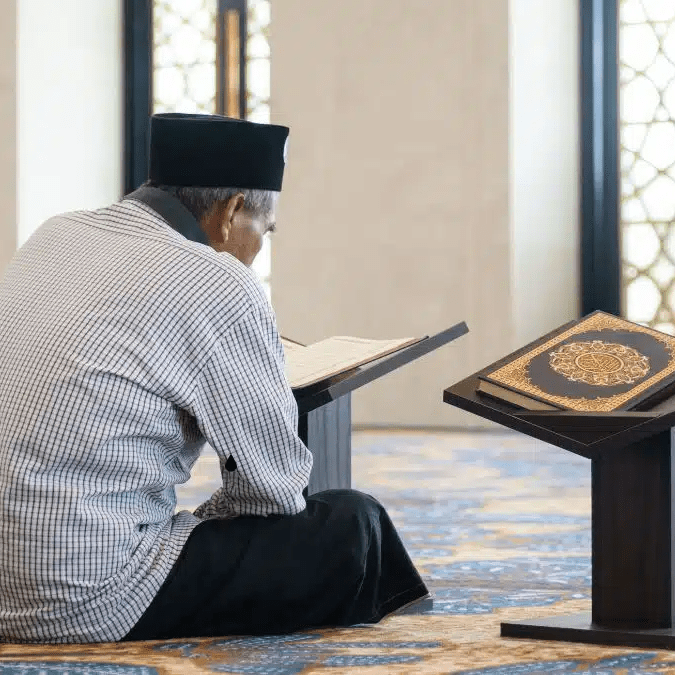
Conclusion
Tahajjud remains the gold standard for voluntary night prayers, rooted in Quranic[31] teachings and the Prophet’s consistent practice. Taraweeh, should not be conflated with Sunnah. Its merit lies in fostering unity and accessibility, not surpassing Tahajjud’s excellence. While congregational Taraweeh ( “ نعم البدعة ” ) was organized by the 2nd Caliph, reviving Tahajjud at home preserves the Prophetic legacy of sincerity and spiritual simplicity, aligning with the Quran’s unambiguous teachings. The greater reward lies in upholding the Sunnah of Tahajjud, as emphasized by the Prophet and maintained by the four Rightly Guided Caliphs. All relevant facts have been presented; the decision is now yours.
But if you lapse after the clear signs that have come to you, then know that God is mighty and wise. (Quran;2:209).
The Messenger(صلى الله عليه وسلم ) said: “I have left you upon a clear path; only the doomed deviate after me” (Ibn Majah 43)[32]
And truly you have come unto Us alone, as We created you the first time. You have left behind you all that which We had bestowed on you. We see not with you your intercessors whom you claimed to be your partners. Now you and they have been cut off, and all that you used to claim has vanished from you. (6:94)[33]

ز مَن بر صُوفی و مُلاّ سلامے: کہ پیغامِ خُدا گُفتَند ما را
ولے تاویلِ شاں در حیرت اَنداخت: خُدا و جبرئیلؑ و مصطفیؐ را
“Convey my greetings to the Sufis and Mullahs, for they have delivered Allah’s commandments to us. Yet, the interpretations they have spun of those commandments have left Allah Almighty, Gabriel (AS), and Muhammad Mustafa (PBUH) utterly astounded.” [— Allama Muhammad Iqbal]
وماعَلَيۡنَاۤ اِلَّا الۡبَلٰغُ الۡمُبِيۡنُ (القرآن36:17)
“And our duty is only to convey (the message) clearly”
[1] https://quran1book.blogspot. com/2023/09/Key2Quran.html
[2] Quran: 2:219, 5:90-91
[3] https://youtu.be/BNtH8I7Kz2w?si=xYCyTX8WmZ11-Udy
[4] https://islamicurdubooks.com/ hadith/hadith-.php?bookid=1&hadith_number=2013
[5] https://bit.ly/Hadith-Basics
[6] http://www.equranlibrary.com/tafseer/tafheemulquran/9/31
[7] https://islamicurdubooks.com/hadith/hadith-.php?- bookid=1&hadith_number=7290
[8] https://islamawakened.com/quran/22/67/default. htm
[9] https://islamqa.info/ur/answers/71184
[10] https://tanzil.net/#trans/en.sahih/17:79
[11] https://islamicurdubooks.com/hadith/hadith-.php?- bookid=1&hadith_number=7290
[12] https://arabicvirtualacademy.com/the-sunnah-ofnot-abandoning-prayer-in-your-homes
[13] https://islamicurdubooks.com/hadith/hadith-. php?bookid=1&hadith_number=2013
[14] https://tanzil.net/#trans/en.sahih/73:20
[15] https://islamicurdubooks.com/hadith/hadith-. php?bookid=1&hadith_number=2010
[16] https://tanzil.net/#8:22
[17] https://tanzil.net/#trans/ur.maududi/6:94
[18] https://islamicurdubooks.com/hadith/hadith-. php?bookid=1&hadith_number=7290
[19] https://islamicurdubooks.com/hadith/hadith-. php?bookid=1&hadith_number=2010
[20] https://www.minhajbooks.com/urdu/tid/46222/
[21] https://islamicurdubooks.com/hadith/hadith-. php?bookid=4&hadith_number=43
[22] https://tanzil.net/#trans/ur.jawadi/59:10
[23] https://tanzil.net/#trans/ur.maududi/2:134
[24] https://tanzil.net/#trans/en.shakir/17:79
[25] https://hadeethenc.com/ur/browse/hadith/11292 https://shiahaq.com/namaz-tarawih-bidat-ahlaysunat-kutub-say/
[26] See Disagreements
[27] Disagreement: Hazrat Mujahid says that a man asked Hazrat Ibn Umar whether it was correct to pray Taraweeh behind the Imam during Ramadan.
[28] https://islamicurdubooks.com/hadith/hadith-.php?- bookid=3&hadith_number=1044
[29] https://bit.ly/Key2Quran
[30] https://tanzil.net/#trans/en.sahih/2:209
[31] https://tanzil.net/#trans/ur.maududi/17:79
[32] https://islamicurdubooks.com/hadith/hadith-.php?bookid=4&hadith_number=43
[33] https://tanzil.net/#trans/en.mubarakpuri/6:94


